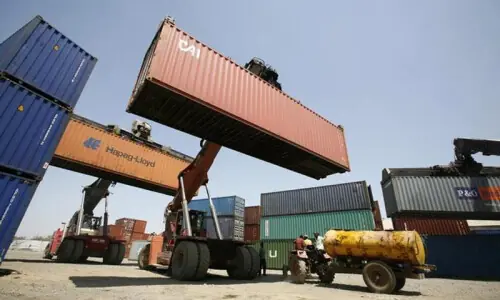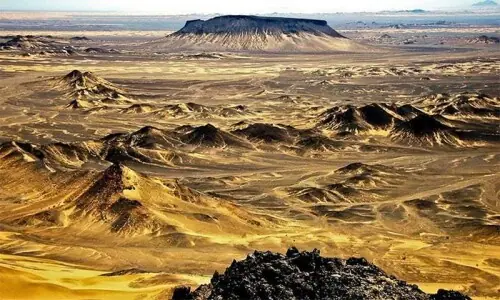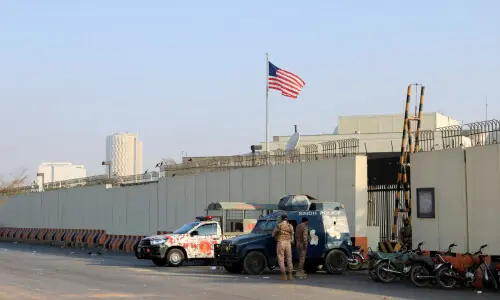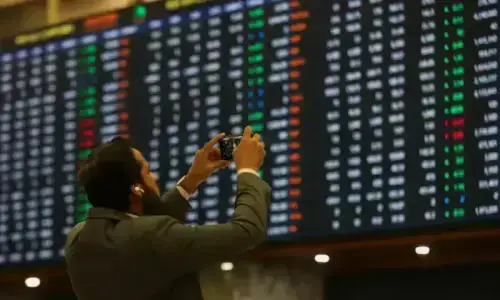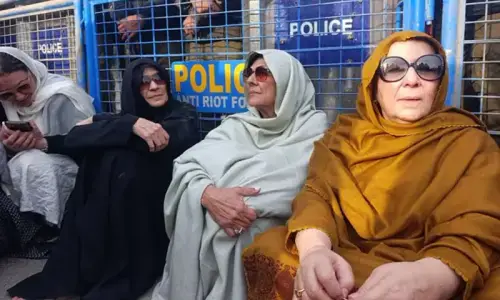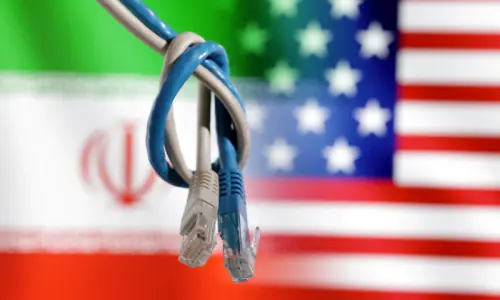At a UNO conference in 2000, all member states signed the ‘Millennium Declaration’ — a solemn pledge to free fellow men, women and children from abject and dehumanizing conditions of life on this planet. That was a shared commitment to universal human rights and social justice, backed by clear, time-bound Millennium Development Goals (MDGs).
Six years later, Pakistan portends progress that is far below most development targets. To live up to its promise
In this special report the Business team of Dawn has tried to assess progress on each of the eight goals and 38 targets. Realising the relevance of public pressure on the government to live up to its commitment, we have also attempted to highlight society’s level of awareness regarding MDGs
 KARACHI: The pace of progress that is so slow that Pakistan is destined to miss majority of the development targets it set for itself to meet the promise of achieving Millennium Development Goals (MDGs) by 2015. Pakistan committed to achieve development goals with 188 other countries in 2000. Nearly half way to the target date, the ball is nowhere near the goal post.
KARACHI: The pace of progress that is so slow that Pakistan is destined to miss majority of the development targets it set for itself to meet the promise of achieving Millennium Development Goals (MDGs) by 2015. Pakistan committed to achieve development goals with 188 other countries in 2000. Nearly half way to the target date, the ball is nowhere near the goal post.
A document released last year: ‘Pakistan millennium development goals report 2005’ confirmed that chances of achievability of the majority of targets, specially those in the health and education sectors, were dim.
Worse still is the fact that the level of awareness in society regarding the eight goals or the 38 specific targets is abysmally low. Therefore, there is absolutely no pressure on the government from local stakeholders to reshape its spending pattern or rearrange its order of priorities to achieve targets leading to sustainable development in the country.
Most leaders and people, who should be spearheading the process in achieving those goals, when contacted, were not informed at all on the subject. Many admitted that they were hearing the word MDGs for the first time. This unaware mass of Pakistanis include people from all strata of society including drivers, clerks, plumbers, teachers, salesmen, doctors, lawyers, traders, housewives, etc.
The situation was not much different in the case of involvement of the lower tiers of government in the efforts. Except for Punjab in rest of the three provinces situation is bleak. In NWFP some spade work started in 2005. The Sindh government in and out of power was found to be too sceptical. Balochistan is too volatile politically to plan or execute a programme for MDGs.
It is not hard to imagine what type of ownership the programme enjoys in the country when after six years of 15 years planned period the information about MDGs has yet to be disseminated. Even the private sector that is supposed to be the key driver of the economy has totally been kept out of the picture in formulation of targets or their implementation. What does this situation translate into?
It means that so far it has all been a close door ministry level activity. Yes, the reference is made to the goals in official documents such as the State Bank Annual Reports and Economic Surveys. Progress reports are prepared for the consumption of development partners (World Bank, IMF, UNDP, etc.) quite religiously.
Our sources in the PM secretariat confirmed that the initial draft of current year’s progress report on MDGs is also ready and is sitting on desk of the PM for approval. The process would then move forward to publish the document. The 2006 progress report is expected to be out by December 2006. It would also probably be launched the way earlier reports were launched, in a quite setting of a five star hotel, in presence of all who matter for the government (foreign dignitaries and representatives of donors). Later it would be despatched to UN and other such forums.
The government would keep the matter to itself. There is no reason to expect that it would involve people or their representatives now if it has opted not to do so in the past. Until now, there is no evidence of any interaction or dialogue with the stakeholders on contents of the progress report or the targets set therein.
This exercise within the confines of ministry saves the government of whatever little pressure the consumerism stricken inward looking depoliticised civil society can exert on it to live up to its promise.
Pakistan, like other member states, signed ‘UN Millennium Declaration’ in the year 2000. It pledged to free men, women and children from abject dehumanising conditions of extreme poverty. It agreed to eight goals. Later after consultation and a recommendation made by four committees constituted to develop country specific targets, a Pakistani version of millennium goals were adopted.
The problem is that most subjects covered under MDGs such as health and education fall in provincial jurisdiction. Besides in a scenario of shrinking public sector these goals may not be achievable without the private sector’s involvement.
But does MDGs really matter? Why worry about goals when the economy has turned around and is paying good dividends?
Economy is projected to be on high growth trajectory with enviable over seven per cent annual growth rates. Pakistan’s financial sector is referred to by the World Bank as the most efficient in South Asia. Pakistan is focus of attention for foreigners as the next probable destination of investment in Asia. International investors are crossing over into Pakistan exploring avenues. They are entering all profit making areas from property and housing to capital markets, to oil and gas sectors, to telecommunication, to banking, to retail chains, to food processing to auto mobiles.
Market of telecommunication is growing astronomically. Quantum and value of imports are setting new records. Property market has risen vertically and is booming. Pakistan’s long-term bonds are selling like hot cakes in the international market. Private sector GDRs in international market are getting oversubscribed. Donors are happy with the economic performance. The surveillance team of the IMF gave clean chit of economic health to Pakistan, two months back. Amidst cries of high inflation urbanites in Pakistan are flocking in markets like never before. When there is so much happening may be over time, the trickle down theory would work and benefits would reach to those left behind.The trouble with this process is that the country seems to be consuming more than what it is accumulating in the form of produced and social wealth. If the level of transformation of additional wealth into produced wealth (barrages, railways, roads, buildings or other physical assets) and social wealth (investment in intangible assets such as human well being and skill development, institution strengthening, etc.,) is too slow, the development will not be sustainable. The anomaly is reflected in growing measure of inter-class, inter-regional and intra-regional disparities in the country.
International consensus is, therefore, that it should be concern of all progressive, forward looking people who see their future tied to the future of the country to strive to make the development process sustainable. As the millennium goals are directed to improve the social capital they are crucial to make the development process in Pakistan sustainable.
As multitude of people left behind may not be as visible or vocal they hold enough weight to puncture the speed of progress. In fact if not pulled up out of the poverty pit they might pull down the rising growth graph. For disparities, if allowed to perpetuate, they could lead to socio and political crisis derailing the whole economy off the development path.
Reaching out to the dispossessed, backward, left out segments in an economy, therefore, is not just an issue of promoting social justice and fairness. It is as much an issue of efficiency and promoting competitiveness for a long term sustainable development.
The MDGs are not some frivolous westernised jargon. They are reflection of realisation by the international community that lopsided growth process has inherent flaws that cast long shadow on prospects of long-term sustainable development. They offer a ray of hope for Pakistan’s crushingly rural poor who only manage to pull through the life at bare survival level. They are condemned to cope with the fear of losing a dear one to disease or ignorance perpetually. These over worked underfed struggling people are also country’s real assets that it needs to learn to care for.
In the rural Sindh, where much of the province’s population dwells, there are forgotten ones working in knee deep water in paddy fields for paltry Rs35 a day to feed 10 members of a family in a country where some can afford to blow up thousands of rupees in the smoke of Havana cigars. There are children who die young from simple malaria. Only this summer, hospitals in Hyderabad were full to the brim with patients suffering from water borne diseases. Many died and the government moved only after the media made a lot of hue and cry.
The onus for failing to meet the goals would fall squarely on the present government, for it has been in power through all the six years that went by since 2000. The fact that the government has not reached mid way to the target shows that it has to speed up the progress.
This is not an enviable situation. Dim prospects of achieving MDGs should ring the alarm bells not just in corridors of power. It should energise all those who count themselves with the people and see the country as home for their children and grandchildren.
It is time to forge a broad based consensus over the goals, to pool resources and to make it happen for ourselves and our future latest by 2015.

